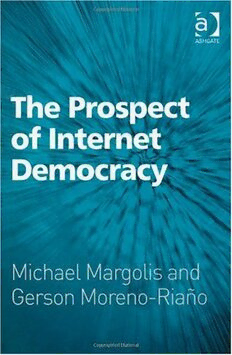
The Prospect of Internet Democracy PDF
200 Pages·2009·2.336 MB·English
Most books are stored in the elastic cloud where traffic is expensive. For this reason, we have a limit on daily download.
Preview The Prospect of Internet Democracy
Description:
The Internet provides ordinary citizens with unprecedented powers to access and distribute information. It opens new opportunities for citizens to organize and mobilize for action but it also provides new channels that established political, social and economic interests can use to extend their powers. Will the Internet revolutionize politics? "The Prospect of Internet Democracy" is a rich and detailed exploration of the theoretical implications of the Internet and related information and communication technologies (ICTs) for democratic theory. Focusing less on how governments use these technologies to enhance information, services and benefits they deliver to citizens as 'customers' or 'consumers', and more on how political uses of the Internet have affected - or seem likely to affect - patterns of influence among citizens, interest groups and political institutions, Margolis and Moreno-Riano argue that the Internet's impact on democratic politics seems destined repeat the history of other innovative ICTs. The likely long-term effects of such uses on the conduct of politics in the USA and other nations that declare themselves modern democracies are examined and the extent to which they help or hinder viable democratic governance is assessed. Accessible to non-specialists, this book is a useful resource to students and scholars of social and communications sciences interested in the dynamics behind the internet-governance debate.
See more
The list of books you might like
Most books are stored in the elastic cloud where traffic is expensive. For this reason, we have a limit on daily download.
